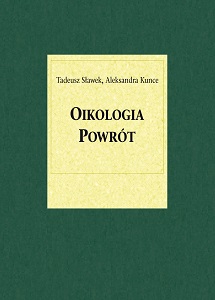Oikologia. Powrót
Oikology. A return
Author(s): Tadeusz Sławek, Aleksandra Kunce
Subject(s): Language and Literature Studies, Studies of Literature
Published by: Wydawnictwo Uniwersytetu Śląskiego
Keywords: oikology; place; home; city; abiding;dwelling;
Summary/Abstract: Why do we return to oikology?Firstly, because we believe that the where of the human and nonhuman existence has a fundamental meaning in ponderings on the dilemmas of the humanities. Oikology is a thinking that conjoins oikos and logos by emphasizing a specific correspondence between the two, as well as that which makes them different and separate. Language and practice of oikos and logos are not the same, thence a concept of home – developed by oikological thinking – would always be a home in translation. The centre of gravity of the oikological thinking ineluctably lies “a little further,” “always further on and on.” We are the ones who have left their home; the ones who have experienced the comforts and failures of rootedness and uprootedness. We are the ones who are gazing from the distance to make something clearer, yet also felt strongly as dearth, a break, a fall. Home – our own, as surroundings, region, community, maybe even Europe, and eventually the world – will be forever marked with this flaw and, perhaps, even the dark. Secondly, pondering upon the where restores to us the meanings once lost and concealed by the resemblance of places, while locality – along with its experiential dimension – restores placement to the human and thus makes one responsible for words and deeds. Place, which oikology keeps finding anew, is entangled with being out of the way, in the motion of distancing oneself from the centre and the hasty knowledge/power. It is a return to experiencing that which is close and distant at the same time. We recognise home in a place off the way, off the world, off the discourses, off the official cultural tract, off the launched mobility of people and things, yet also off the propaganda of stability and familiarity. Oikology invites us to loosen functional thinking and hasty household practices. Thirdly, oikology touches upon philosophy, literature, anthropology, maybe even politics, for it assumes that “home” is as much given to us as continually constructed. Hence it is assigned to us in order that we can face this challenge; it leads to our appreciation of the entanglement of home, place, city, wander and source. An encounter with the city, a spiritual dimension of a place, return to the source, a crack of the post-industrial space and weaving the motion with the permanence of things, as well as quest for the household lore in a particular space-time (Silesia, Europe, the world). Place comes to be out of an individual experience of the commonly available spaces and their critical reading. This critical impulse is indispensable, for the rhetoric of “home” practised in politics presents it as a set of commonplace, unquestioned, thus, in its own way, inconspicuous frames, where our life is located. Oikology makes an attempt to show how unapparent these frames are. Therefore, fourthly, oikology attempts to show how entangled the circumstances where our identity is being constructed in a place really are. Home is not viewed here as a permanent, tangible localisation, but it is an experience to gain, which cannot be neglected in any discussions on the human being. Oikology (the Silesian oikology included) thus leaves the human – be it the wandering or the settled one – with a chastising and alarming question to answer: Are you really so convinced that home has let you go into the world so easily? Has your home gone so easily from you, or so blithely let you go?
Series: Nauki społeczne
- E-ISBN-13: 978-83-226-3683-1
- Print-ISBN-13: 978-83-226-3682-4
- Page Count: 240
- Publication Year: 2019
- Language: Polish
- Sample-PDF
- Table of Content
- eBook-PDF

